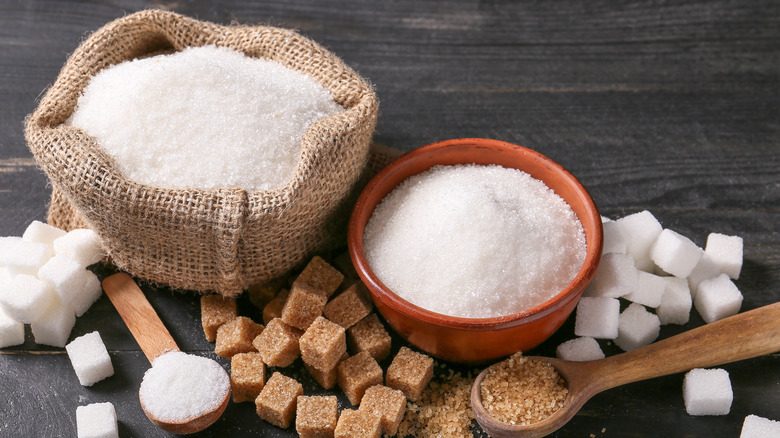How Sugar Impacts Your Bladder
We all know that sugar can contribute to cavities, weight gain, and diabetes, but its impact is much greater than that. This sneaky ingredient has been linked to dementia, kidney and liver disease, nerve damage, cardiovascular problems, and cancer, warns the American Heart Association. Over time, it can affect your brain, eyes, and muscles, causing all sorts of issues. On top of that, it promotes inflammation and can speed up aging.
Perhaps not surprisingly, added sugar can also affect your bladder. A 2018 study found that hyperglycemia, or high blood sugar, may cause bladder inflammation in diabetic mice, according to the journal Research and Reports in Urology. Scientists explain that sugar acts as a diuretic, reducing the amount of water reabsorbed in the kidneys. Therefore, it increases urine excretion, resulting in more trips to the bathroom (per Livestrong). At the same time, it puts stress on the bladder, causing it to work harder than it should.
Sugary foods and beverages may contribute to diabetes, too. This chronic disease can negatively impact the bladder and kidneys, notes the above review. So, if you need one more reason to cut back on sugar, read on.
The surprising link between sugar and bladder health
Nutrition and bladder health are strongly connected. For example, caffeine and acidic foods and beverages like vinegar, soda, and citrus fruits can irritate the bladder and worsen existing conditions, such as urinary urgency, explains the University of Iowa Hospitals & Clinics. Sugar has similar effects, according to the National Association for Continence (NAFC). This common ingredient stimulates the bladder, which can cause the urge to pee. As a result, it can aggravate urinary incontinence.
All sugars, including natural sugars, can stimulate and irritate the bladder. Artificial sweeteners can also cause this effect, according to NAFC. What's more, excess sugar consumption increases the risk of hyperglycemia, weight gain, and diabetes, which can all cause or worsen incontinence. This common additive feeds bacteria which can lead to a higher risk of urinary tract infections.
Sugar also plays a role in the onset of cystitis, or bladder inflammation. Cookies, candies, white bread, and other foods rich in simple carbs can raise blood glucose levels (per American Diabetes Association). This may cause glycosuria, or excess sugar in the urine. This condition promotes bacterial growth in the urinary tract, putting you at risk for cystitis, according to the Health Service Executive.
Given these risks, it's best to limit sugar and seek healthier alternatives. Also, consider starting a food diary to figure out which foods irritate your bladder.


